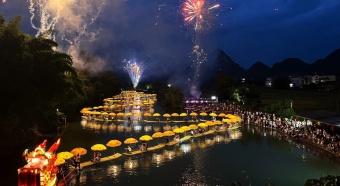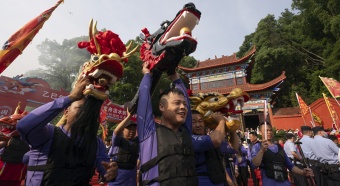On summer days, Yang Rui enjoys strolling near an ancient wall encircling east China's Nanjing.
Her leisure moment is seldom disturbed by the bricks' pock-marking with bullet holes left 78 years ago when invading Japanese troops captured the then Chinese capital.
"I seldom noticed those marks of war before," admits Yang, a 25-year-old Nanjing native who is now working in advertising in Tokyo.
Even as China marks the 70th anniversary of the end of World War II and its war against Japanese aggression, it's possible to go about daily life in this bustling city without being haunted by the Japanese's brutality that followed the invasion. But memories of the Nanjing Massacre never vanish.
"Every December 13, sirens sound across the city to remind us of the massacre. It's the darkest moment in modern China, it happened right here in Nanjing, and I will never forget," Yang tells Xinhua.
Japanese troops occupied Nanjing on Dec. 13, 1937. Over the next six weeks, they slaughtered 300,000 people in the city.
Local schools are one of the places where Nanjing residents' mixed feelings about Japan are most keenly felt.
Speaking Japanese may help a young person secure a good job, as Yang found, but Japanese language courses are understandably not the first choice for most Nanjing students.
In Nanjing Foreign Language School, one of Jiangsu Province's top high schools, students study languages for six years alongside their regular courses. According to the school's website, 320 students are studying English, French, German and Japanese this year.
The school declined to give the number of students enrolled each year for the Japanese class, but Yang, who studied Japanese at the school from 2002 to 2008, said the class usually had a mere dozen or so students in those years.
Even this small number could "fluctuate with ups and downs in Sino-Japanese relations," she says.
According to a teacher from the class, "people in Nanjing are particularly sensitive to Japan-related topics. Some parents do not want their children to learn Japanese language because of the history issues."
Despite the opposition, it is from occasions such as the Japanese class that the young generation of Nanjing can learn about Japan and its people.
"Our Japanese teacher was an old gentleman. He was very patient to teach us," Yang recalls. "We later learnt that he came to China as a volunteer just because he wanted to reflect on history."
"Even after leaving the school, we kept in contact by writing letters. He once told me that every year when the siren in Nanjing wailed to commemorate the victims of the Nanjing Massacre, he would hide in his room with a heavy heart."
"That is an impressive detail for me," Yang says. "Friendly exchanges between us and Japanese people should continue."









